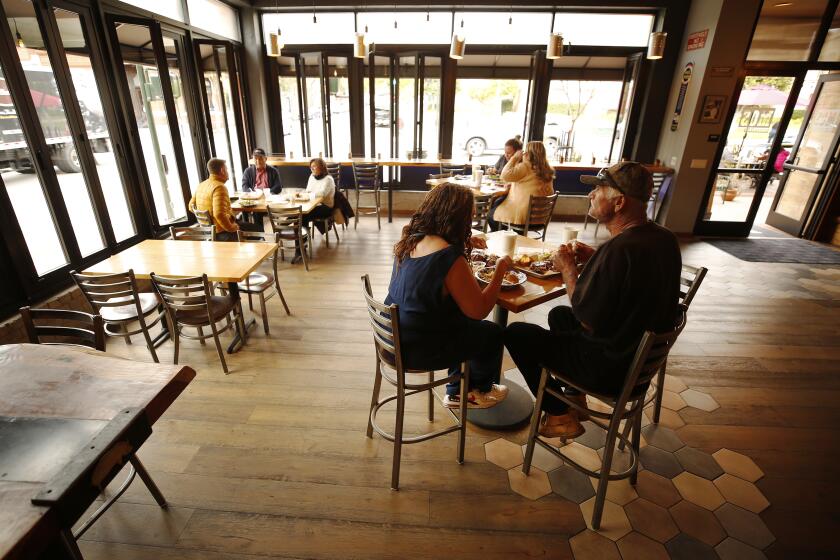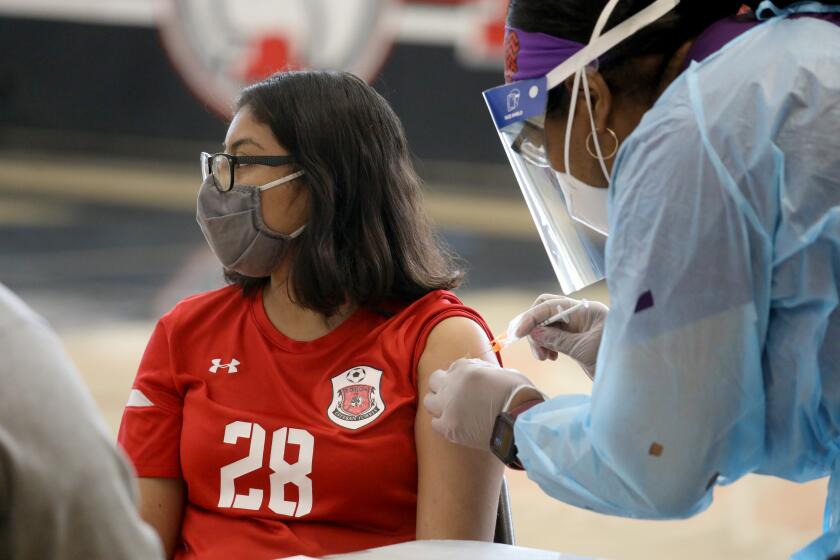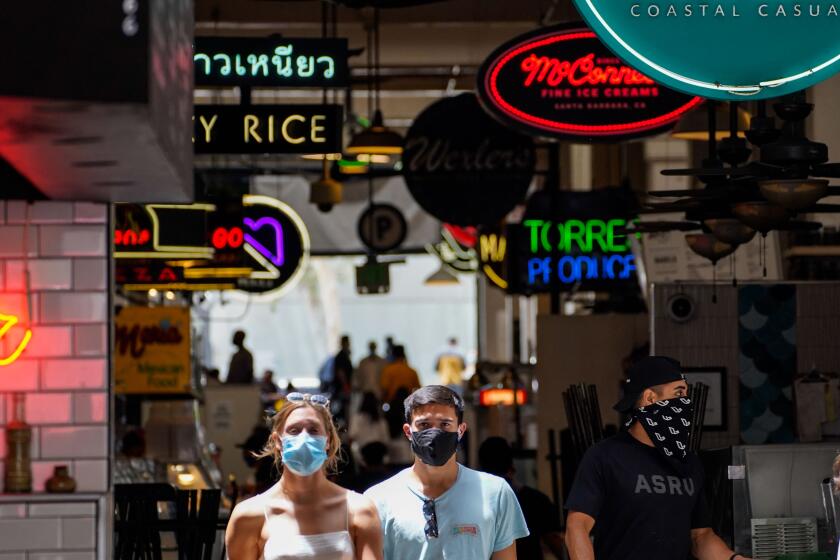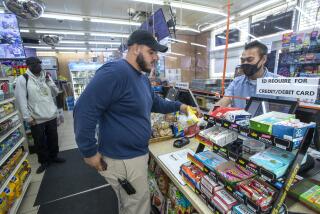The rules, the risk, the freedom: Everything you need to know about California reopening
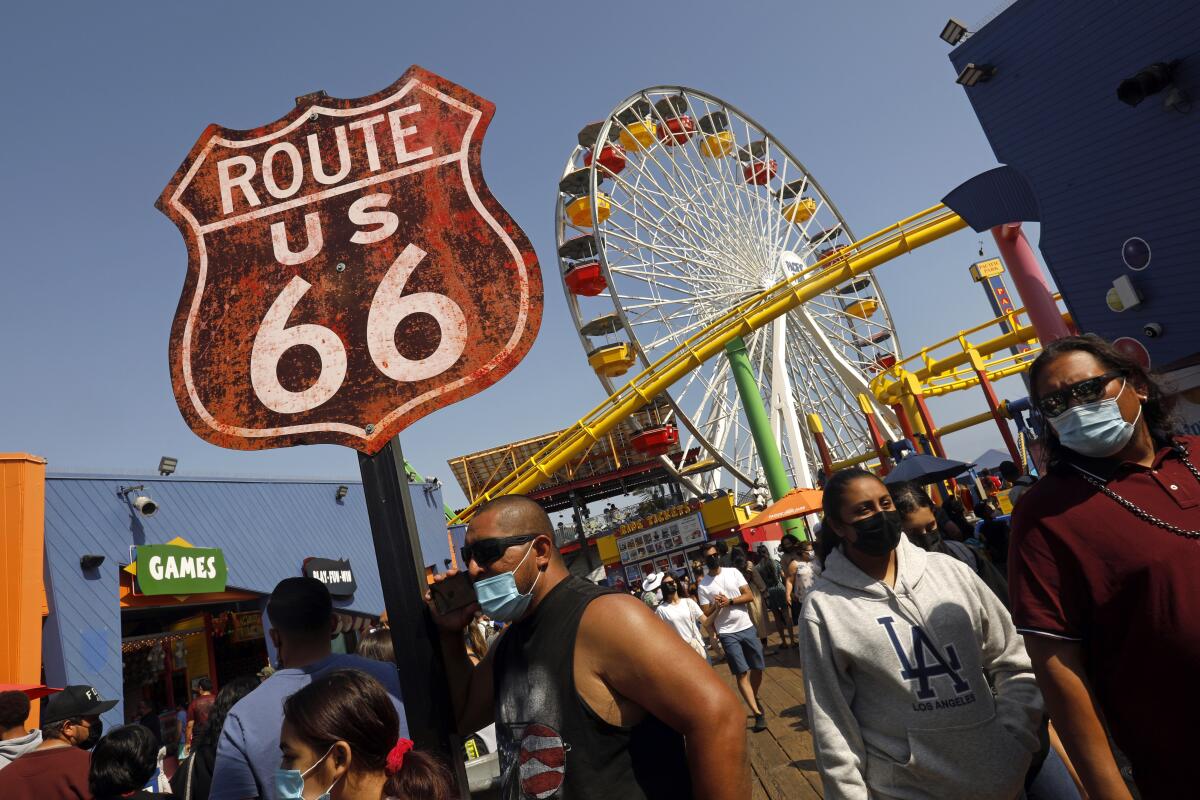
- Share via
Today marks a new era for California: The state at 12:01 a.m. Tuesday rescinded most mask rules for vaccinated people and ended capacity limitations on businesses and venues.
Here’s a rundown of what changed today and in the days to come.
Most mask rules end for vaccinated people
For the general population, fully vaccinated people are no longer required by the state to wear masks in most public settings, such as stores, restaurants, gyms, movie theaters and family entertainment centers — bowling alleys, arcades, trampoline parks, ice skating rinks and the like.
A person is considered fully vaccinated two weeks after receiving their second dose of the Pfizer-BioNTech or Moderna vaccines, or two weeks after receiving their only dose of the Johnson & Johnson vaccine.
Among the businesses that will put up signs allowing vaccinated customers to enter without a mask Tuesday is Ralphs and Food 4 Less, a spokesman for the supermarkets’ parent company, Kroger, said.
Unvaccinated people are still required to mask up, according to the latest order by the California Department of Public Health.
People who are always exempt from mask rules include babies younger than 2; people with a medical reason, mental health condition or disability that prevents wearing a mask; and people who are hearing impaired or communicating with someone who is hearing impaired because the ability to see the mouth is essential for communication.
Where mask rules will still apply
Under an order issued by the U.S. Centers for Disease Control and Prevention, everyone still has to wear masks on public transit, such as airports, airplanes, subway stations, trains and buses.
The CDC will soon allow people to stop wearing masks in outdoor areas associated with public transportation, but the agency will still recommend unvaccinated people mask up.
In California, masks are still required for everyone in healthcare settings, prisons and jails, shelters, cooling centers and in indoor settings of K-12 schools and child-care settings.
Vaccinated workers might be able to go maskless this week
Mask rules in effect at a workplace are regulated by the state’s occupational safety authority, not the state Department of Public Health.
As a result, it may be later this week before fully vaccinated workers are allowed to remove their masks in the workplace and for physical distancing requirements to be rescinded. The state’s Occupational Safety and Health Standards Board is expected to vote on a proposal Thursday.
Officials originally suggested that even if the board votes to approve the measure, the earliest the new rules would become effective is June 28, a result of the standard 10 days of review by the Office of Administrative Law.
But on Monday, Gov. Gavin Newsom said that if the board approves the new rules, he planned to issue an executive order that would make the rules effective immediately.
Under the proposed rules, unvaccinated workers would still need to wear masks in indoor workplaces. Some of the only exceptions to the mask-wearing rule is unvaccinated workers who are alone in a room or are eating or drinking, in which case they should keep at least 6 feet apart from other people.
Sign up for Essential California
The most important California stories and recommendations in your inbox every morning.
You may occasionally receive promotional content from the Los Angeles Times.
Unvaccinated workers might become eligible for N95 masks
Under the same proposal being considered by the state safety standards board, California would require employers to provide respirators — such as N95 masks that filter out tiny particles from the air — to employees not yet fully vaccinated if workers request them.
N95s are far more plentiful now than they were in the early months of the pandemic.
Most businesses aren’t required to check customers’ vaccine status
Most businesses and venues are not obligated by the state to check customers’ vaccination status.
As a result, businesses can choose to allow an unmasked customer to enter a store, and the fact that the customer is unmasked is effectively a “self-attestation” that the person is vaccinated.
Businesses also have the option of implementing some kind of vaccine verification system to determine whether the customer needs to wear a mask. They can also require all patrons to wear a mask.
Sign up for Essential California
The most important California stories and recommendations in your inbox every morning.
You may occasionally receive promotional content from the Los Angeles Times.
Stricter documentation requirements for indoor ‘mega events’
For indoor events with more than 5,000 people — such as sporting events or a convention — all attendees must submit documentation of their status as being fully vaccinated or a pre-entry negative coronavirus test to enter. An early test will come Friday at Staples Center when capacity will rise from as many as 7,500 fans to the full capacity of 20,000 when the Clippers host the Utah Jazz in an NBA playoff game.
Proof of full vaccination includes a vaccination card, a printed copy of it, a photo of it stored on a phone or documentation from a healthcare provider. The state offers businesses and venue operators the option of accepting a self-attestation — basically a signed statement saying the person is vaccinated — as proof of vaccination.
San Francisco has issued stricter rules than the state. If a venue operator of an indoor “mega event” allows self-attestation as proof a guest or worker is vaccinated, then everyone else at the venue age 2 and older must wear a mask at all times during the event unless eating or drinking.
The self-attestation must be done under penalty of perjury and disclose the type of vaccine taken and the date of last dose administered, according to the San Francisco health officer order.
Capacity limits on restaurants, theme parks and other businesses go away
Many businesses have endured months of capacity limits as California has slowly reopened since the winter peak of the pandemic.
Even in counties in the least-restrictive tier of California’s reopening framework, which was retired Tuesday, capacity at restaurants, gyms and movie theaters had been capped at 50%; theme parks, at 35%; and bars that don’t serve food, at 25%.
All of those capacity limits required by the state go away. Restrictions at open bars and buffets go away too.
As California reopens its economy, capacity limitations, mask requirements and social distancing will no longer be required in most venues.
Vaccinated people can still wear masks if they want
No one can be banned from wearing a mask as a condition of entry into a business or as a condition of participating in an activity, the California Department of Public Health said.
And under rules proposed by the California Occupational Safety and Health Administration, or Cal/OSHA, employers must allow workers to wear masks if they choose to do so, unless it would create some kind of safety hazard, such as interfering with the safe operation of equipment.
Digital vaccine records may be coming available soon
Newsom said Monday that the state will be announcing some kind of opportunity through which residents can request an electronic version of the vaccination records. It’s expected to enable people to get their vaccine information downloadable as a scannable document that can be shared.
“It’s just the ability now to have an electronic version of that paper version. And so you’ll hear more about that in the next couple of days,” Newsom said.
“A lot of people have vaccination cards — you go to a big concert, you’re doing a large indoor event [with] thousands of people. That event may say: ‘We just want to make sure you’re verified as vaccinated,’” Newsom said. “This will just simply be a digitized version. It’s not a passport. It’s not a mandate.”
Officials will draw the winners of $1.5-million prizes for the vaccinated
There will be $1.5-million cash prizes given out to 10 winners, who will be selected Tuesday.
With certain exceptions, all California residents — regardless of immigration status — who have received at least one COVID-19 vaccine dose will be eligible.
The state has already drawn the prospective recipients of cash prizes of $50,000 each that will be given to 30 winners.
California residents who began to get vaccinated starting on or after May 27 are also eligible for a $50 prepaid card or a $50 grocery card for supermarkets such as Ralphs, Food 4 Less, Albertsons, Vons, Pavilions, Safeway and Andronico’s. There are 2 million gift cards available.
California’s ‘Vax for the Win’ program seeks to boost interest in vaccines by offering cash rewards. If you’ve gotten a shot, you’re already eligible.
Newsom on Monday also announced six dream vacation packages as part of the state’s Vax for the Win incentive program.
Californians 18 and older who have received at least one dose of the COVID-19 vaccine will have a chance to win one of six getaways in the Golden State during a drawing July 1. Eligible Californians are automatically entered in the lottery.
Among the destinations are seeing the Giants play in San Francisco, enjoying a spa in Palm Springs, visiting Disneyland in Anaheim, enjoying floor seats at a Lakers game in Los Angeles and learning how to surf in San Diego.
Financial relief remains available for those owing overdue rent, utility bills
Newsom said billions of dollars in financial aid are available for tenants hurting from the pandemic.
California has already approved $2.6 billion to help tenants to pay back rent amid hardship caused by the COVID-19 pandemic. Newsom has proposed to double the amount available for rent relief to $5.2 billion to pay 100% of back rent owed by low-income tenants as well as rent for some future months.
The rent relief program has been hampered by a slow start, confusion and bureaucratic red tape. Newsom on Monday urged those in need to apply.
“If you’ve been directly impacted by this pandemic, and you need rental support, the state of California — when I sign the budget in a couple weeks — we’ll pay 100% of that debt to your landlord and 100% of utility costs,” he said.
The California Legislature is weighing several proposals to provide financial help to residents who have suffered economic hardship because of the COVID-19 pandemic.
Times staff writers Priscella Vega and Patrick McGreevy contributed to this report.
More to Read
Sign up for Essential California
The most important California stories and recommendations in your inbox every morning.
You may occasionally receive promotional content from the Los Angeles Times.
